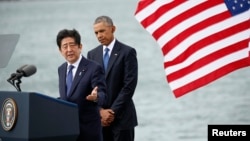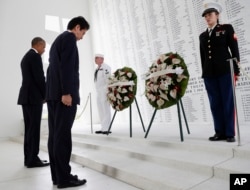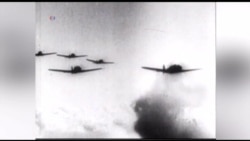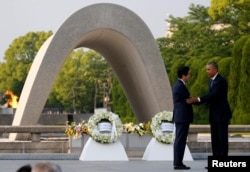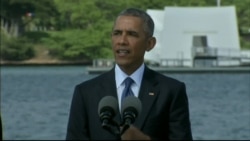ນາຍົກລັດຖະມົນຕີຍີ່ປຸ່ນ ທ່ານ Shinzo Abe ໄດ້ສະແດງຄວາມຮູ້ສຶກ “ອັນລຶກຊຶ້ງ ແລະຄວາມເສົ້າສະຫລົດໃຈຢ່າງບໍ່ສິ້ນສຸດ” ຂອງການເສຍຊີວິດຂອງຊາວອາເມຣິກັນຫລາຍກວ່າ 2,400 ຄົນຈາກການໂຈມຕີຂອງຍີ່ປຸ່ນທີ່ທ່າເຮືອ Peal Harbor ທີ່ລັດ Hawaii ເມື່ອ 75 ປີກ່ອນ.
ການຫຼອນໂຈມຕີໃສ່ກອງທັບເຮືອສະຫະລັດເຂດປາຊິຟິກໃນວັນທີ 7 ເດືອນທັນວາ ປີ 1941 ໄດ້ເຮັດໃຫ້ສະຫະລັດເຂົ້າສູ່ສົງຄາມໂລກຕັ້ງທີສອງ.
ທ່ານ Abe ກ່າວໃນເວລາຢ້ຽມຢາມຢ່າງເປັນປະຫວັດສາດທີ່ທ່າເຮືອ Pearl Harbor ໃນວັນອັງຄານວານນີ້ວ່າ “ພວກເຮົາຕ້ອງບໍ່ເຮັດໃຫ້ຊໍ້າຄືນຄວາມໂຫດຮ້າຍຂອງສົງຄາມນີ້ອີກ.”
“ໃນນາມນາຍົກລັດຖະມົນຕີຢີ່ປຸ່ນ ຂ້າພະເຈົ້າຂໍສະແດງຄວາມເສົ້າສະຫລົດໃຈຢ່າງບໍ່ສິ້ນສຸດຕໍ່ດວງ ວິນຍານຂອງບັນດາຜູ້ທີ່ໄດ້ເສຍຊີວິດຂອງເຂົາເຈົ້າຢູ່ທີ່ນີ້ ພ້ອມດ້ວຍວິນຍານຂອງບັນດາຜູ້ຊາຍ ແລະຜູ້ຍິງທີ່ອົງອາດກ້າຫານທັງໝົດ ທີ່ຊີວິດຂອງເຂົາເຈົ້າໄດ້ສູນເສຍຍ້ອນສົງຄາມທີ່ເກີດຂຶ້ນຢູ່ທີ່ນີ້.”
ທ່ານ Abe ບໍ່ໄດ້ກ່າວຂໍຂະມາໂທດຕໍ່ການໂຈມຕີຂອງຍີ່ປຸ່ນ. ຄະນະບໍລິຫານຂອງທ່ານໄດ້ກ່າວຢ່າງຈະແຈ້ງວ່າ ການຂໍຂະມາໂທດບໍ່ແມ່ນຄວາມຕັ້ງໃຈຂອງທ່ານ ແລະກ່າວວ່າຈຸດປະສົງການເດີນທາງທ່ານ Abe ໄດ້ສະແດງໃຫ້ເຫັນວ່າ ສຳພັນທະໄມຕີ ສະຫະລັດ-ຍີ່ປຸ່ນ ໄດ້ຫັນປ່ຽນນັບແຕ່ຫລັງສົງຄາມເປັນຕົ້ນມາ.
ທ່ານ Abe ໄດ້ຢືນຢູ່ຄຽງຂ້າງ ປະທານາທິບໍດີສະຫະລັດ ທ່ານ Barack Obama ລະຫວ່າງຮ່ວມພິທີ່ຢູ່່ ຖານທັບ Peal Harbor-Hickam ໃນເກາະ Honolulu.
ໃນຕອນຕົ້ນໆ ຜູ້ນຳທັງສອງໄດ້ວາງພວງມະລາຢູ່ ສຸສານ USS Arizona. ພວກເພິ່ນ ພາກັນລັບຕາ ແລະຢືນງຽບສະຫງົບຊົ່ວລະຍະນຶ່ງຫລັງຈາກໄດ້ ໂຍນກີບດອກໄມ້ລົງສູ່ນໍ້າ ໄກ້ກັບບ່ອນກຳປັ່ນລົບຫລົ້ມ ບ່ອນທີ່ຊາກເຂົ້າຂີ້ໝ້ຽງຍັງສາມາດເຫັນໄດ້ຈາກໜ້ານໍ້າຢູ່.
Japanese Prime Minister Shinzo Abe has expressed "sincere and everlasting condolences" to the families of the more than 2,400 Americans killed in Japan's World War II attack on Pearl Harbor, Hawaii, 75 years ago.
"We must never repeat the horrors of war," Abe said Tuesday, paying tribute to the "brave men and women" who were killed in the surprise attack on December 7, 1941, that triggered America's entry into the war.
"As the prime minister of Japan, I offer my sincere and everlasting condolences to the souls of those who lost their lives here, as well as to the spirits of all the brave men and women whose lives were taken by a war that commenced in this very place."
Abe did not apologize for the Japanese attack. His staff made it clear that an apology was not his intention, and said the purpose of Abe's trip was to show how U.S.-Japan relations have evolved since the war.
Abe stood alongside U.S. President Barack Obama during a ceremony at Joint Base Pearl Harbor-Hickam in Honolulu.
Earlier, the two leaders laid wreaths at the USS Arizona Memorial in Pearl Harbor. They closed their eyes and stood silently for a few moments after tossing flower petals into the water near the sunken battleship, whose rusting hull can still be seen just below the surface of the water.
In his remarks at the base, Obama called the U.S.-Japan alliance the cornerstone of peace in the Asia-Pacific region and a force for progress around the world. He said Abe's presence at Pearl Harbor was a reminder of what's possible between nations and peoples, adding that it showed that wars could end and enemies could become allies.
"This historic gesture speaks to the power of reconciliation ... a reminder that even the deepest wounds of war can give way to friendship and a lasting peace," Obama said.
In May, Obama became the first sitting U.S. leader to visit the Japanese city of Hiroshima, where in 1945 U.S. forces dropped the first atomic bomb to be used as a weapon of war, killing an estimated 140,000 people. A second bomb on Nagasaki three days later killed 70,000 more.
Obama also declined to apologize for the atomic attacks, but instead honored the dead and noted the legacy of what he called the "terrible force unleashed in the not so distant past."
"We have a shared responsibility to look directly into the eye of history and ask what we must do differently to curb such suffering again," Obama said then.
The president added, "And perhaps, above all, we must reimagine our connection to one another as members of one human race."
Japan unconditionally surrendered to the United States five days after the Nagasaki bombing. Instead of gloating and humiliating its former enemy, the United States helped to rebuild Japan into one of the world's most prosperous democracies with a thriving economy and a progressive government that swore off militarism.
Abe is the first Japanese prime minister to visit the USS Arizona memorial. He also is the first Japanese leader to visit Pearl Harbor with an American president.
The last Japanese prime minister to come to Pearl Harbor was Shigeru Yoshida, who made a brief stop there in 1951, before the memorial was built to honor those who died on the battleship during the Japanese attack. The memorial is accessible only by boat.
On Monday, Abe laid a wreath and stood in silence at Honolulu's National Memorial Cemetery of the Pacific, which holds the remains of military members, including many who served in the war.
Among those buried there is former Hawaii Senator Daniel Inouye, who fought in the war and whose parents were Japanese immigrants. Abe laid a separate wreath at Inouye's gravesite.
The prime minister also laid a wreath at the nearby Ehime Maru Memorial for nine people who died in 2001 when a U.S. Navy submarine collided with their Japanese fishing vessel.
Jeffrey Hornung, research fellow at the Washington-based Sasakawa Peace Foundation, a U.S./Japan think tank, says Abe's visit is intended to send a message. The recipients, he said, are President-elect Donald Trump, who has been critical of Japan's financial support for the U.S. military presence in Japan, and Japan's Asian neighbors.
"It sends a symbolic message to, not only the incoming president-elect, but also to the region, that the U.S.-Japan alliance is stronger than ever, that we are able to confront past problems between us and still be stronger as allies," said Hornung.
Hornung said that, more than 75 years after the sneak attack that brought the United States into World War II, the bitter feelings created by the war have faded on both sides.
"And of course a lot of the younger generation don't know the significance of Pearl Harbor, but given that these two countries were bitter rivals and enemies just two or three generations ago, it's amazing that they have been able to come this far and reconcile their past histories," he said.
ອ່ານຂ່າວນີ້ເພີ້ມເປັນພາສາອັງກິດ




